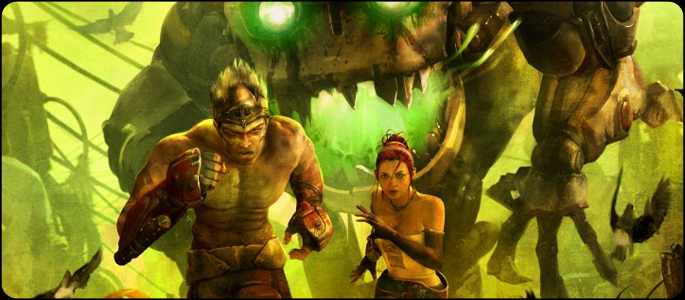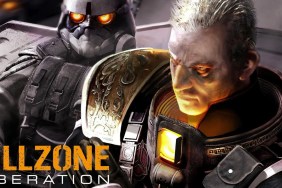
In 2007, Sony and Ninja Theory released Heavenly Sword, one of the earliest big-budget exclusives for the PS3, released within a year of its launch. The game had a huge marketing push, and was often described as “God of War with a chick”, but Heavenly Sword failed to achieve the sales, critical acclaim, and notoriety of Sony’s mythological franchise. It wasn’t a complete disaster, and many reviews seemed to like it enough to see the potential of a possible sequel, but instead Ninja Theory began working on a new project: the multiplatform post-apocalyptic action-adventure game Enslaved: Odyssey to the West. With Enslaved only a few months from release, Namco-Bandai let some members of the press get a look at it earlier this month, and Ninja Theory’s distinct style was definitely present.
Much like Majin and the Forsaken Kingdom, another upcoming Namco-Bandai game, Enslaved puts you in control of two main characters who must work cooperatively to survive. Loosely based on the Chinese novel Journey to the West, the setting is about a hundred and fifty years in the future, a time when robots rule the land and the human race is all but extinct. Amidst the post-apocalyptic chaos, a physically strong man named Monkey teams up (against his will and better judgment) with Trip, a woman with strong technological skills. Though Trip’s ability to manipulate electronics and make useful tools comes in handy, she must be protected by Monkey throughout their journey. They need each other to survive, and if one dies, the game is over.
The whole post-apocalyptic, post-human race setting is nothing new in this industry, but that doesn’t mean there isn’t room for more games that want to present their own vision of a less-than-ideal future. Ninja Theory’s design style is very distinct, especially when it comes to their characters; while observing Enslaved, I was reminded of how strongly I felt about Heavenly Sword’s Nariko and Kai, and perhaps Monkey and Trip have the potential to be just as memorable. The environments are also quite interesting, as the main characters use a combination of technological know-how and martial arts to further their journey and stay alive.
Heavenly Sword wasn’t perfect, but it was certainly a good stepping stone for Ninja Theory. Three years later, the developer is hoping to use the lessons it learned on its next title, and it appears that they are on the right path. I love a good post-apocalypse story, and I think Ninja Theory can take an old idea and make it feel new again. . I can’t say that it’s my most anticipated game of the year, but I’m definitely interested in seeing more.








